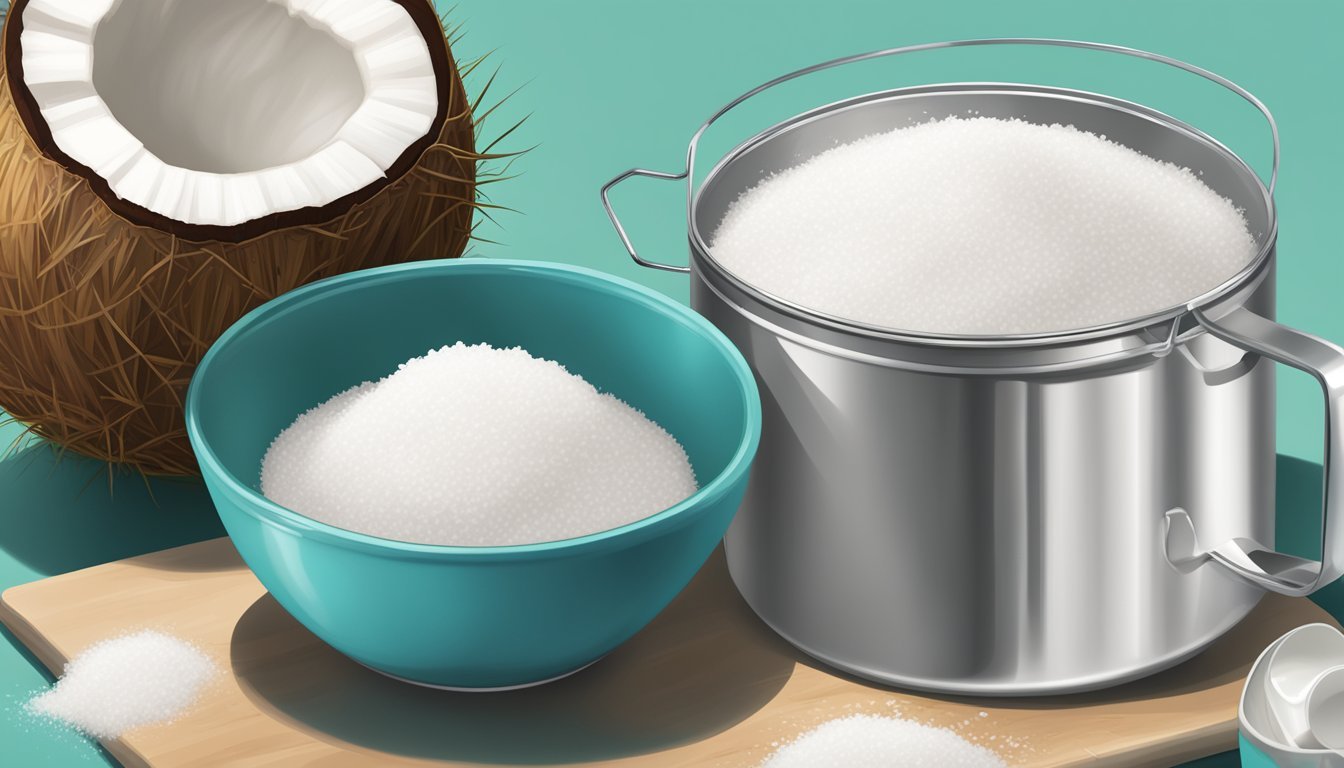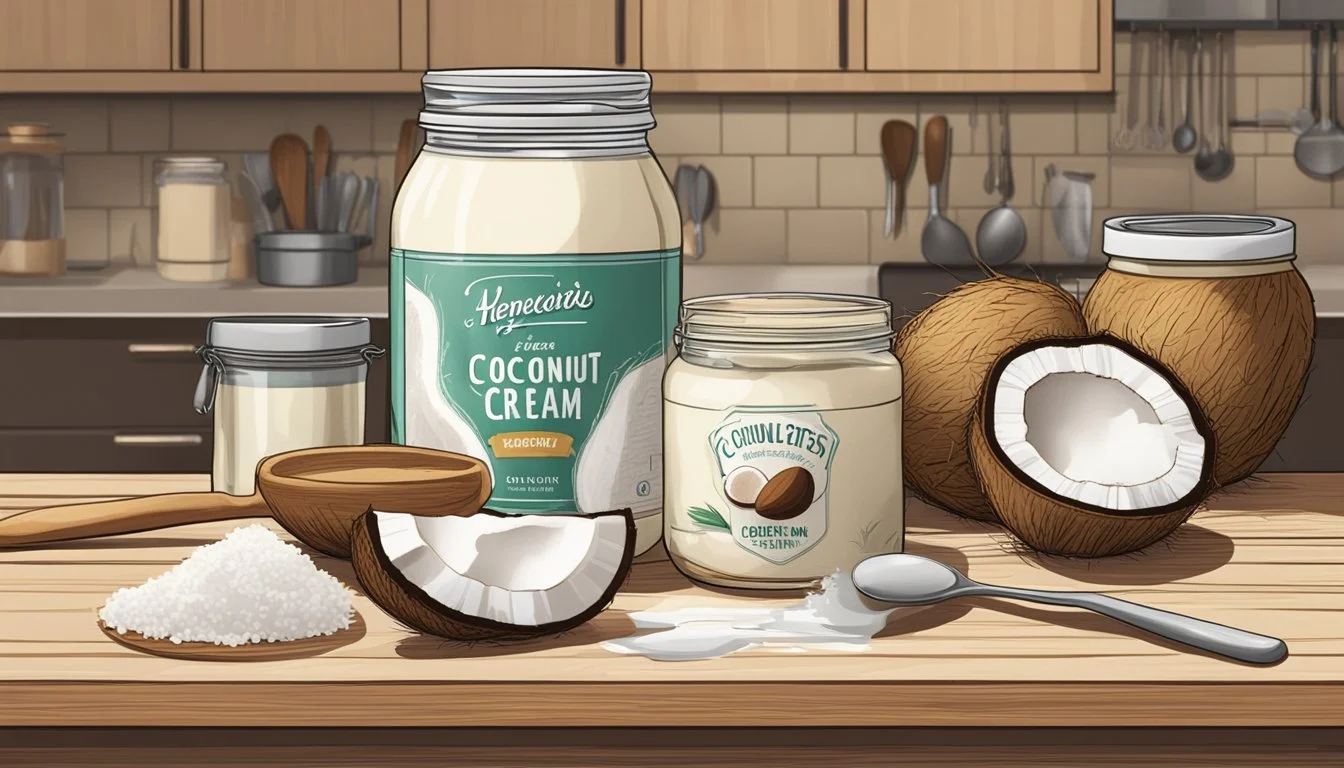Does Coconut Cream Go Bad?
Shelf Life and Storage Tips
Coconut cream, a popular ingredient in many recipes, does have a limited shelf life. Cream of coconut can indeed go bad. Storing it properly is crucial to maintaining its quality and safety.
Unopened coconut cream typically has a longer shelf life and can be kept in a cool, dark pantry. Once opened, it's essential to transfer the cream to an airtight container and store it in the refrigerator, where it can last between 4 to 7 days. Homemade coconut cream has an even shorter shelf life, often best used within 1-2 days.
Choosing the right storage method can significantly extend the shelf life of your coconut cream. Heat, light, and humidity can accelerate spoilage, so keeping the cream in a consistently cool environment is crucial. If at any point the coconut cream looks, smells, or tastes off, it’s safer to discard it.
Understanding Coconut Cream
Coconut cream is a versatile ingredient derived from coconut meat. It serves various culinary and nutritional purposes, making it a valuable addition to many dishes. Below, the composition, nutritional profile, and culinary uses of coconut cream are detailed to provide a comprehensive understanding.
Composition and Varieties
Coconut cream is made by simmering and then straining the grated meat of mature coconuts. It's thicker and richer than coconut milk due to a higher fat content.
Different varieties include unsweetened coconut cream, which is commonly used in cooking, and cream of coconut, which is sweetened and often used in desserts and cocktails. Commercially, coconut cream may contain stabilizers like guar gum to maintain texture.
Nutritional Profile
Coconut cream is rich in fats, predominantly medium-chain triglycerides (MCTs) which are considered easier for the body to metabolize.
Nutritionally, a primary serving (100 grams) includes:
Calories: ~330
Fats: ~35g
Proteins: ~3g
Carbohydrates: ~6g
It's also a source of vitamins, such as vitamin C, and minerals like iron and selenium. Being dairy-free and vegan, it's an excellent substitute for those with dietary restrictions.
Culinary Uses
Coconut cream is used in a variety of recipes ranging from desserts to savory dishes. It's a staple in Asian dishes and curries due to its ability to add richness and depth.
In cooking, it can be used to thicken soups and make tropical recipes creamy. In desserts, it's ideal for making dairy-free whipped cream, ice creams, and piña coladas. For savory dishes, it complements sauces for seafood and vegetarian meals.
Whether enhancing savory meals or creating luscious desserts, coconut cream’s versatility makes it indispensable in the kitchen.
Shelf Life and Spoilage
Coconut cream has a limited shelf life and requires careful storage to maintain its freshness. Proper storage and attention to signs of spoilage are crucial to preventing health risks.
Factors Influencing Shelf Life
The shelf life of coconut cream depends largely on whether it is opened or unopened. Unopened cans of coconut cream can last up to two years beyond the expiration date if stored in a cool, dry place. Once opened, transferring the cream to an airtight container and refrigerating it extends its shelf life to around 4 to 7 days.
Storage conditions like temperature play a significant role. Keeping the cream at a consistent, low temperature helps maintain its quality. Homemade coconut cream generally has a shorter shelf life compared to store-bought options due to the lack of preservatives.
Signs of Spoilage
Indicators that coconut cream has gone bad include changes in smell, taste, and appearance. A sour or unpleasant odor is a primary sign of spoilage. The consistency may also alter, appearing more watery or lumpy. Visible mold or discoloration means it should be discarded immediately.
If the cream tastes off or has an unusual flavor, it’s best to throw it out. Checking these signs ensures that spoiled cream does not compromise the dish or cause health issues.
Food Safety Concerns
Spoiled coconut cream can harbor harmful bacteria like Salmonella or E. coli, which pose health risks. Even if it initially seems fine, bacteria can grow rapidly in improperly stored or expired cream. It’s essential to follow expiration dates and storage guidelines to minimize these risks.
Using fresh, properly stored coconut cream reduces the chance of foodborne illnesses. Practicing good hygiene when handling and storing the cream also helps ensure safety.
Risks of Consuming Spoiled Cream
Consuming spoiled coconut cream can lead to food poisoning, with symptoms including nausea, vomiting, and diarrhea. Mold contamination is another risk, which can cause allergic reactions or respiratory issues.
Health risks from spoiled cream are more severe for individuals with weakened immune systems, young children, and the elderly. It is crucial to be vigilant about the freshness of coconut cream and dispose of any that show signs of spoilage.
Storage Solutions
Proper storage of coconut cream significantly extends its shelf life and maintains its quality. Whether it’s canned or homemade, refrigerated or frozen, each storage method has specific guidelines to ensure the best results.
Ideal Conditions for Storage
Coconut cream should be stored in a cool, dry pantry. It should be kept away from direct sunlight and sources of heat to avoid spoilage. Unopened canned coconut cream can be safely stored in the pantry for months. However, once it’s opened, it must be transferred to an airtight container and placed in the refrigerator. Using this method helps in maintaining its freshness and extending its usability.
Refrigerating Unopened and Opened Cans
Unopened cans of coconut cream can be kept at room temperature in the pantry. Upon opening, the coconut cream must be refrigerated immediately. Transfer the contents into an airtight container and place it in the refrigerator. Opened canned coconut cream typically lasts for 4 to 7 days under refrigeration. For homemade coconut cream, which lacks preservatives, it’s best to use within 3 days. Labeling and dating the containers can help keep track of freshness.
Freezing Coconut Cream
Freezing coconut cream is an effective way to preserve it for long-term use. Place fresh or opened coconut cream into a freezer-safe airtight container, leaving about ½ an inch of headspace to allow for expansion. Coconut cream can be stored in the freezer for up to 6 months. Using an ice cube tray to freeze small portions makes it easier to thaw only what’s needed. When ready to use, defrosting should be done in the refrigerator to maintain its texture and flavor.
Proper storage techniques for coconut cream ensure it remains fresh and usable, whether you choose to refrigerate or freeze it. By following these guidelines, you can enjoy its rich and creamy texture in your recipes for a longer period.
Utilization and Substitution
Coconut cream is a versatile ingredient used in a variety of dishes, and it also has several alternatives when you need a substitute. It can enhance recipes and be adapted in multiple ways, offering dairy-free and flavor-rich options.
Adapting Recipes with Coconut Cream
Coconut cream is known for its rich, creamy texture and distinct flavor, making it an excellent addition to both sweet and savory dishes.
In curries and soups, it provides a smooth, velvety base that complements spices and herbs effectively. Desserts like puddings and pies benefit from its thickness, which helps achieve a creamy consistency.
For those seeking to replace dairy, coconut cream can be used to make whipped cream by chilling it and whipping it just like dairy cream. It also works well in sauces and marinades, imparting a subtle coconut flavor while ensuring a rich texture.
Alternative Uses
Beyond cooking, coconut cream also has applications in beauty and wellness.
In skincare, it acts as a natural moisturizer, suitable for dry or sensitive skin. Its fatty acids help to hydrate and nourish the skin, making it an ingredient in many DIY beauty treatments.
For haircare, coconut cream can be used as a deep conditioner. Its moisturizing properties help to soften the hair and reduce frizz. Simply apply to the hair, leave it on for 15-20 minutes, and rinse thoroughly for soft, shiny hair.
Finding Substitutes for Coconut Cream
Several substitutes can be used when coconut cream is not available, depending on the recipe.
One of the best alternatives is coconut milk, which, while thinner, can be thickened with cornstarch or arrowroot powder. Nut butters like almond or cashew butter mixed with water serve as a good substitute due to their similar texture and richness.
Other effective replacements include pureed silken tofu and heavy cream for those who do not need a dairy-free option. Blended sweet potato can also mimic the texture and add a unique flavor to dishes.
When looking for coconut cream, searching for non-dairy alternatives such as coconut butter or coconut meal can be useful, especially for those with dietary restrictions.
Creative Forms of Utilization
Coconut cream offers versatility in both sweet and savory dishes, making it a staple in various culinary traditions. Its rich, creamy texture and subtle coconut flavor enhance desserts, drinks, curries, and soups.
Crafting Delicious Desserts
Coconut cream is a key ingredient in many indulgent desserts. It enriches coconut flan, adding a luscious texture and tropical flavor.
Coconut rice pudding benefits from its creamy consistency and sweet undertones.
In beverages like pina coladas, coconut cream provides a rich and smooth base, perfectly complementing pineapple and rum. Combining it with chocolate results in delectable chocolate coconut truffles.
Homemade coconut ice cream also shines with the inclusion of coconut cream, offering a dairy-free alternative that is both rich and satisfying.
Enhancing Savory Dishes
Coconut cream excels in savory applications, imparting a unique richness to Thai green curry. It creates a silky texture while balancing the spiciness of the curry paste.
In soups, it adds creaminess to Thai-style coconut soup, enhancing the overall flavor profile.
Curries benefit from its ability to meld spices together smoothly.
When making coconut shrimp, the cream aids in achieving a moist and tender coating.
Additionally, Asian cooking often utilizes coconut cream to enrich dishes without overpowering other flavors. Storing coconut cream in an airtight container and refrigerating it can extend its shelf life, maintaining its freshness for future cooking endeavors.




